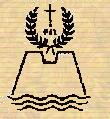|
AN
UNPLEASANT TOPIC
This
topic attracts very few because it does not contain a philosophical,
oratorical or poetic art which might instruct the mind or polish the tongue
or delight the ears; instead, it exhorts us to meditate on death and to
think about things which are not generally pleasant to the rich and powerful
man, like poverty, humility, patience and other Christian virtues.
Why
are so few eager to learn the art of dying well? "For the number of
fools is infinite." (Sir. 1:15) There is no greater folly than to
neglect the art upon which depended the greatest and eternal goods and to
waste one's time mastering the innumerable arts of increasing and preserving
perishable goods.
No
one is willing to consider that, in death, one must render to God an account
of all one has done, said and thought, and even of one idle word; where the
devil is our accuser, our conscience the witness, God our judge and
punishment or reward is eternal. Doesn't this make the art of dying well the
most important of arts? While many prepare for the smallest litigation, it
is amazing how many face their Divine judge with utterly no preparation.
This is why mortals rush to hell in great numbers. "If the just man
scarcely will be saved, where will the impious and the sinner appear."
(I Pt. 4:18)
Death
is evil because it is opposed to life which is undeniably good. "By the
envy of the devil, death came into the world." (Wis. 1:13) But God saw
to it that good can come out of death. "Precious in the sight of the
Lord is the death of the Saints." (Ps. 116:15) And so Christ, by His
death, destroyed death and, by rising, restored our life. Christ's death
made death good. Thus, St. Ambrose entitled his book, "The Good of
Death," showing that some deaths can be good.
Two
goods can be derived from death. Firstly, it ends all the miseries of life,
that is, if you do not end up in hell. "Great labor is created for all
men and a heavy yoke upon the children of Adam from the day of their coming
out of their mother's womb until the day of their burial." (Sir. 40:1)
Secondly, death brings an excellent good in that it opens the door to God's
kingdom, "Blessed are the dead who die in the Lord." (Rec. 14:13)
For those who are led to purgatory, death frees them from the fear of hell
and makes them certain of future everlasting happiness.
Even
for those destined to hell, death brings some benefit. . .it prevents their
punishment from increasing. Thus, death has lost its sting. "For me, to
die is gain." Thus, Paul exhorts the Thessalonians not to be saddened
by the deaths of their loved ones but look upon them as asleep.
Thus,
Catherine of Genoa described death as most fair and beautiful that flees
from those who seek it and seeks those who flee from it. Death, as the
offspring of sin, is evil; but, by the grace of Christ, it became in many
ways useful and salutary, lovable and desirable.
St.
Robert Bellarmine
(08-25-03)
|
